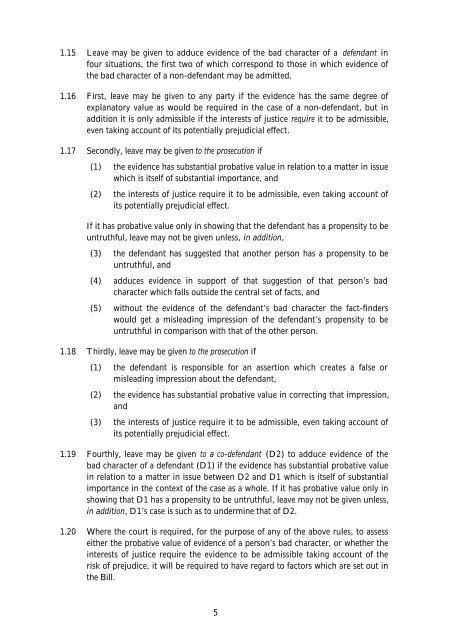Evidence of Bad Character in Criminal ... - Law Commission
Evidence of Bad Character in Criminal ... - Law Commission
Evidence of Bad Character in Criminal ... - Law Commission
Create successful ePaper yourself
Turn your PDF publications into a flip-book with our unique Google optimized e-Paper software.
1.15 Leave may be given to adduce evidence <strong>of</strong> the bad character <strong>of</strong> a defendant <strong>in</strong><br />
four situations, the first two <strong>of</strong> which correspond to those <strong>in</strong> which evidence <strong>of</strong><br />
the bad character <strong>of</strong> a non-defendant may be admitted.<br />
1.16 First, leave may be given to any party if the evidence has the same degree <strong>of</strong><br />
explanatory value as would be required <strong>in</strong> the case <strong>of</strong> a non-defendant, but <strong>in</strong><br />
addition it is only admissible if the <strong>in</strong>terests <strong>of</strong> justice require it to be admissible,<br />
even tak<strong>in</strong>g account <strong>of</strong> its potentially prejudicial effect.<br />
1.17 Secondly, leave may be given to the prosecution if<br />
(1) the evidence has substantial probative value <strong>in</strong> relation to a matter <strong>in</strong> issue<br />
which is itself <strong>of</strong> substantial importance, and<br />
(2) the <strong>in</strong>terests <strong>of</strong> justice require it to be admissible, even tak<strong>in</strong>g account <strong>of</strong><br />
its potentially prejudicial effect.<br />
If it has probative value only <strong>in</strong> show<strong>in</strong>g that the defendant has a propensity to be<br />
untruthful, leave may not be given unless, <strong>in</strong> addition,<br />
(3) the defendant has suggested that another person has a propensity to be<br />
untruthful, and<br />
(4) adduces evidence <strong>in</strong> support <strong>of</strong> that suggestion <strong>of</strong> that person’s bad<br />
character which falls outside the central set <strong>of</strong> facts, and<br />
(5) without the evidence <strong>of</strong> the defendant’s bad character the fact-f<strong>in</strong>ders<br />
would get a mislead<strong>in</strong>g impression <strong>of</strong> the defendant’s propensity to be<br />
untruthful <strong>in</strong> comparison with that <strong>of</strong> the other person.<br />
1.18 Thirdly, leave may be given to the prosecution if<br />
(1) the defendant is responsible for an assertion which creates a false or<br />
mislead<strong>in</strong>g impression about the defendant,<br />
(2) the evidence has substantial probative value <strong>in</strong> correct<strong>in</strong>g that impression,<br />
and<br />
(3) the <strong>in</strong>terests <strong>of</strong> justice require it to be admissible, even tak<strong>in</strong>g account <strong>of</strong><br />
its potentially prejudicial effect.<br />
1.19 Fourthly, leave may be given to a co-defendant (D2) to adduce evidence <strong>of</strong> the<br />
bad character <strong>of</strong> a defendant (D1) if the evidence has substantial probative value<br />
<strong>in</strong> relation to a matter <strong>in</strong> issue between D2 and D1 which is itself <strong>of</strong> substantial<br />
importance <strong>in</strong> the context <strong>of</strong> the case as a whole. If it has probative value only <strong>in</strong><br />
show<strong>in</strong>g that D1 has a propensity to be untruthful, leave may not be given unless,<br />
<strong>in</strong> addition, D1’s case is such as to underm<strong>in</strong>e that <strong>of</strong> D2.<br />
1.20 Where the court is required, for the purpose <strong>of</strong> any <strong>of</strong> the above rules, to assess<br />
either the probative value <strong>of</strong> evidence <strong>of</strong> a person’s bad character, or whether the<br />
<strong>in</strong>terests <strong>of</strong> justice require the evidence to be admissible tak<strong>in</strong>g account <strong>of</strong> the<br />
risk <strong>of</strong> prejudice, it will be required to have regard to factors which are set out <strong>in</strong><br />
the Bill.<br />
5

















